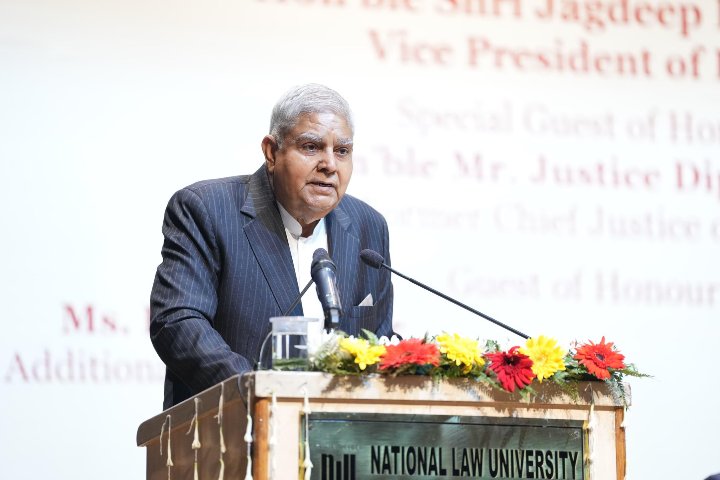VP Dhankhar Calls for Cultural Renaissance Through Indian Knowledge Systems
In a deeply philosophical observation, Shri Dhankhar asserted, “Knowledge resides beyond manuscripts. It lives in communities, in embodied practices, in the intergenerational transmission of wisdom.”

- Country:
- India
At the inaugural Annual Conference on Indian Knowledge Systems (IKS) held in New Delhi, the Vice-President of India, Shri Jagdeep Dhankhar, delivered a landmark address emphasizing the urgent need to revive India’s intellectual and civilizational traditions. Speaking as the Chief Guest, he articulated a vision for India's global ascent—one rooted not just in economic and political metrics, but in cultural and intellectual resurgence.
In a stirring keynote, the Vice-President said, “India’s rise as a global power must be accompanied by the rise of its intellectual and cultural gravitas. The strength of a nation lies in the originality of its thought, the timelessness of its values, and the resilience of its intellectual traditions.”
Reclaiming India’s Civilizational Identity
Shri Dhankhar underlined that India is not merely a modern political entity formed in the mid-20th century but is instead a “civilizational continuum—a flowing river of consciousness, inquiry, and learning” that has endured for millennia. Reaffirming India's intrinsic identity, he decried the historical marginalization of indigenous knowledge traditions under colonial and pre-colonial regimes.
He sharply criticized the deliberate erasure of indigenous wisdom, describing it as more than historical oversight: “It was an architecture of erasure… Western constructs were paraded as universal truths. To put it more bluntly, untruth was camouflaged as truth.”
Two Historical Ruptures: Islamic Invasions and British Colonization
Reflecting on the interrupted trajectory of India’s intellectual legacy, the Vice-President identified two major historical breaks in the continuum of Bharatiya Vidya Parampara:
-
Islamic Invasions: These, he said, led to contempt and destruction, halting India’s vibrant tradition of assimilation and intellectual flowering.
-
British Colonial Rule: This brought about a systematic subversion of Indian Knowledge Systems (IKS). “We stopped thinking and started cramming,” he lamented, adding that India’s centers of learning were reoriented to produce clerks rather than thinkers—“Brown babus for the East India Company.”
These disruptions, he emphasized, not only led to physical destruction of institutions but also a psychological shift, pushing generations of Indians away from critical thinking, inquiry, and spiritual reflection.
Ancient Universities as Citadels of Global Knowledge
Paying homage to India’s ancient centers of learning—Takshashila, Nalanda, Vikramashila, Vallabhi, and Odantapuri—the Vice-President described them as “towering citadels of knowledge” that predated European universities by centuries. These were cosmopolitan hubs, attracting scholars from Korea, China, Tibet, Persia, and other regions, where the intellect of the world embraced the spirit of Bharat.
He highlighted the fact that these ancient institutions were not merely academic centers but spiritual and philosophical ecosystems promoting inquiry across metaphysics, science, medicine, ethics, and cosmology.
Knowledge Beyond Manuscripts
In a deeply philosophical observation, Shri Dhankhar asserted, “Knowledge resides beyond manuscripts. It lives in communities, in embodied practices, in the intergenerational transmission of wisdom.” He called for a paradigm shift in how knowledge is perceived and preserved, urging scholars and institutions to recognize the value of contextual, experiential, and oral traditions alongside textual research.
Actionable Roadmap for IKS Revival
Calling for focused, tangible action, the Vice-President outlined several key recommendations to revitalize Indian Knowledge Systems:
-
Creation of Digitized Repositories: A national-level initiative to digitize classical texts in Sanskrit, Tamil, Pali, and Prakrit.
-
Global Accessibility: Ensuring these digital archives are accessible to international scholars and researchers.
-
Robust Training Programs: Developing interdisciplinary training modules combining philosophy, computational analysis, ethnography, and comparative frameworks.
-
Empowering Young Scholars: Encouraging youth to engage with IKS using modern methodological tools and critical inquiry.
Fusion of Tradition and Innovation
Addressing the commonly perceived divide between spirituality and science, the Vice-President argued for a synergistic relationship:
“The wisdom of the past does not obstruct innovation—rather it inspires it. The metaphysical can speak to the material.”
Examples included the Rigveda's cosmic hymns resonating with astrophysics and the Charaka Samhita aligning with contemporary debates on medical ethics and public health. He urged scholars to explore such bridging insights, where ancient wisdom offers direction for modern challenges.
Relevance in a Fractured World
Shri Dhankhar warned of growing global instability and the pressing need for philosophical and ethical frameworks that can help humanity navigate crises. “As we face a fractured world,” he said, “systems of thought that have reflected for centuries on duty, consequence, and the cosmic order become more relevant than ever.”
Eminent Dignitaries in Attendance
The event also saw the presence of notable dignitaries including:
-
Shri Sarbananda Sonowal, Union Minister of Ports, Shipping and Waterways
-
Prof. Santishree Dhulipudi Pandit, Vice Chancellor, Jawaharlal Nehru University
-
Prof. M. S. Chaitra, Director of IKSHA, and Akhil Bharatiya Toli Sadasya of Prajna Pravah
These academic and policy leaders echoed the Vice-President's sentiments and reinforced the need for collaborative efforts between academia, government, and civil society.
A Call for Intellectual Self-Respect
The Vice-President’s address culminated in a clarion call to Indians—particularly scholars, educators, and youth—to reclaim intellectual self-respect and invest in the civilizational mission of India. Quoting Max Müller’s timeless admiration for Indian thought, he reminded the audience that India has long been a beacon of profound philosophical insight, and it is now time to reclaim that mantle with renewed purpose.










